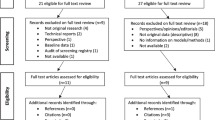Abstract
The UK National Health Service (NHS) is in the process of further reforms aimed at restoring a national focus to its activities and also at enhancing the quality of the service it provides. Key features are: (i) the formation of primary care groups to replace general practitioner (GP) fundholders, holding a single devolved budget for the majority of NHS services; (ii) a move towards defining outcome and performance indicators for the NHS; (iii) the establishment of new bodies to develop and monitor the implementation of clinical guidelines; (iv) the evaluation of new technologies including pharmaceuticals; and (v) a new framework termed ‘clinical governance’ for the long term maintenance of quality.
This approach to quality and outcomes may start to move the NHS away from its focus on processes, but in the short term at least, the ability to make this change is limited by the performance indicators available. Many of these indicators are process markers rather than true outcomes, but given the poor outcomes data currently collected by the NHS, it may be all that is possible for the moment.
The commitment to better quality in the NHS may make underfunding of the NHS more obvious and lead to further political difficulties for the government. Disease management systems which have in-built markers of their quality, both in terms of the service provided and its outcomes, may look increasingly attractive to the NHS. Outcomes research in the NHS will remain clinically focused for the moment but, with the explicit consideration of cost effectiveness underlying clinical guidelines in the future, a gradual move to the US type of outcomes research is possible in the future.
Similar content being viewed by others
References
Secretary of State for Health. The New NHS — modern, dependable. London: Stationary Office, 1997
Scally G, Donaldson LJ. Clinical governance and the drive for quality improvement in the new NHS in England. BMJ 1998; 317: 61–5
UK Department of Health. The new NHS modern and dependable: a national framework for assessing performance (consultation document). London: UK Department of Health, 1998
Shekelle P, Roland M. Measuring quality in the NHS: lessons from across the Atlantic. Lancet 1998; 352: 163
McColl A, Roderick P, Gabbay J, et al. Performance indicators for primary care groups: an evidence based approach. BMJ 1998; 317: 1354–60
Secretary of State for Health. A first class service: quality in the new NHS. London: Stationary Office, 1998
Goodman NW. Clinical governance. BMJ 1998; 317: 1725–7
Faster access to modern treatment: how NICE appraisal will work [online]. Available from: www.doh.gov.uk/nice/appriase.htm [Accessed 1999 Feb 3]
Canadian Coordinating Office on Health Technology Assessment. Guidelines for the economic evaluation of pharmaceuticals. Ottawa: CCOHTA, 1997
Dowie J. Towards the equitably efficient and transparently decidable use of public funds in the deep blue millennium. Health Econ 1998; 7: 93–103
Walley T, Edwards RT. Is there a need for an independent centre for pharmacoeconomics in the UK? Pharmacoeconomics 1994; 5: 93–100
Walley T, Rawlins M, Stein K. Health technology assessment: the role of the pharmaceutical panel. Br J Clin Pharmacol 1998; 45: 217–20
Wilson R, Hatcher J, Barton S, et al. Influences of practice characteristics on prescribing in fundholding and non-fundholding general practices. BMJ 1996; 313: 595–9
Wilson R, Hatcher J, Barton S, et al. General practice fundholders prescribing savings in one region of the UK 1991–4. Health Policy 1997; 42: 29–37
Duerdan M, Walley T. Prescribing at the interface between primary and secondary care in the UK: towards joint formularies? Pharmacoeconomics. In press
Henshall C, Drummond M. Economic appraisal in the British National Health Service: implications of recent developments. Soc Sci Med 1994; 38: 1615–23
Walley T, Edwards RT. Health economics in primary care in the UK: containment of drug costs. Pharmacoeconomics 1993; 3: 100–6
Drummond M, Cooke J, Walley T. Economic evaluation under managed competition: evidence from the UK. Soc Sci Med 1997; 45: 583–95
Anonymous. Screening for osteoporosis to prevent fractures. Effective Health Care Bulletin no. 1. Leeds: University of Leeds, 1992
Walley T, Barton S, Cooke J, et al. Economic evaluation of drug therapy: attitudes of prescribing advisers in Great Britain. Health Policy 1997; 41: 61–72
Ross J. The use of economic evaluations in health care: Australian decision makers’ perceptions. Heath Policy 1995; 31: 103–10
Health economics in the USA: expectations, applications and future directions. Washington, DC: IMS America, 1997
Hunter D, Fairfield G. Disease management. BMJ 1997; 315: 50–3
Short R. UK and Germany: European leaders in disease management implementation? Pharmacoeconomics Outcomes News 1996; Feb 10
Pilling M, Walley T. Effective contracting of high tech health care for patients at home. J Manage Med 1996; 10: 6–14
Drummond M. Disease management: who needs it and why? Discussion paper 152. York: Center for Health Economics, University of York, 1997
Woods D. Exportability of managed care is limited. BMJ 1997; 315: 701
Walley T, Barton S. Disease management. Lancet 1996; 347: 1768–9
Kozma C, Reeder C. Pharmacoeconomics: where does it fit into disease management? Dis Manage Health Outcomes 1997; 2: 55–64
Burns H. Disease management and the drug industry: carve up or carve out? Lancet 1996; 347: 1021–3
NHS Executive EL (94)94 Commercial approaches to the NHS regarding disease management packages. Leeds: NHS Executive, 1994
Boyle S. The private finance initiative. BMJ 1997; 314: 1214
Author information
Authors and Affiliations
Corresponding author
Additional information
About the Author: Dr Walley is Glaxo Professor of Clinical Pharmacology at the University of Liverpool, England. His research interests are in pharmacoepidemiology and pharmacoeconomics. He is also a consultant physician at the Royal Liverpool University Hospital with particular interests in acute medicine and hypertension.
Rights and permissions
About this article
Cite this article
Walley, T. Outcomes, Outcomes Research and Disease Management. Dis-Manage-Health-Outcomes 5, 197–207 (1999). https://doi.org/10.2165/00115677-199905040-00002
Published:
Issue Date:
DOI: https://doi.org/10.2165/00115677-199905040-00002




